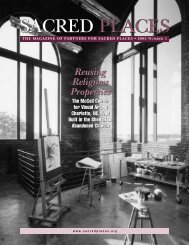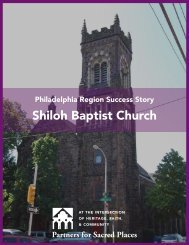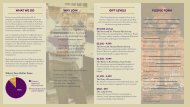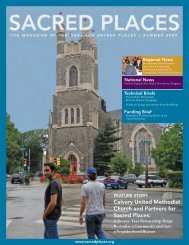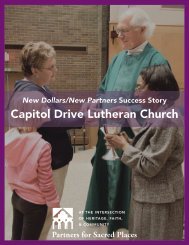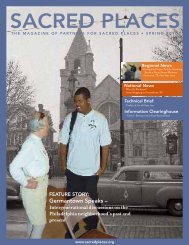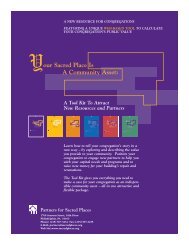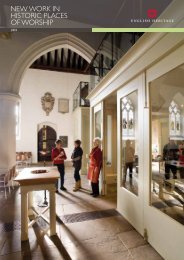FEATURE STORY - Partners for Sacred Places
FEATURE STORY - Partners for Sacred Places
FEATURE STORY - Partners for Sacred Places
You also want an ePaper? Increase the reach of your titles
YUMPU automatically turns print PDFs into web optimized ePapers that Google loves.
UPDATE on <strong>Partners</strong>:<br />
Exemplars Project<br />
Since the publication of its pioneering <strong>Sacred</strong> <strong>Places</strong> at Risk study in 1998, <strong>Partners</strong> <strong>for</strong> <strong>Sacred</strong><br />
<strong>Places</strong> has worked to sustain the quantity and diversity of community services and programs<br />
that congregations provide. That research, conducted in partnership with the University of<br />
Pennsylvania’s School of Social Work, helped to quantify the value of congregations in their<br />
communities. In recent years, recognizing the need to articulate the quality of those programs as<br />
well, <strong>Partners</strong>’ staff has looked <strong>for</strong> new ways and new research to tell the story of community-serving<br />
programs based in historic sacred places.<br />
Launched with support from<br />
the William Penn Foundation,<br />
the Exemplars Project sought<br />
to identify, spotlight, and build<br />
awareness of congregation-based<br />
programs and social services that are<br />
particularly innovative, af<strong>for</strong>dable,<br />
and effective. This initiative,<br />
which was piloted in Philadelphia<br />
and presents opportunities <strong>for</strong><br />
replication nationwide, offers new<br />
evidence — to members of both<br />
the public and private sectors — of<br />
the centrality of sacred places in<br />
community life.<br />
Neighborhood Bike<br />
Works, hosted by St.<br />
Mary’s Episcopal Church,<br />
Hamilton Village, in<br />
West Philadelphia, PA,<br />
is an innovative youth<br />
development program<br />
that introduces kids to<br />
a world of opportunities<br />
through bicycles. In<br />
after-school, weekend,<br />
and summer classes,<br />
participants ages 8-18<br />
join in the Earn-a-Bike<br />
program where they<br />
learn about bike safety<br />
and repair. After fixing<br />
up bikes donated by<br />
the community, the kids<br />
graduate with a bike of<br />
their own, a helmet, and<br />
a lock.<br />
Based on the preliminary<br />
recommendations and criteria<br />
established by an advisory group,<br />
<strong>Partners</strong> engaged the Public Health<br />
Management Corporation (PHMC)<br />
to evaluate program quality in<br />
seven program areas: after-school<br />
programs; health promotion and<br />
nutrition education; behavioral<br />
health and addictions treatment;<br />
programs serving the homeless;<br />
older adult services; business and<br />
community development; and<br />
adult education. Characteristics of<br />
exemplary programs in an eighth<br />
program area — childcare — were<br />
drawn from the Commonwealth of<br />
Pennsylvania’s Keystone STARS<br />
program, which is an initiative<br />
of the state’s Office of Child<br />
Development and Early Learning<br />
to improve, support, and recognize<br />
the continuous quality improvement<br />
ef<strong>for</strong>ts of early learning programs.<br />
The learnings from PHMC’s<br />
research present tremendous<br />
opportunities <strong>for</strong> congregations<br />
looking to start or strengthen a<br />
social service program in their<br />
5 • <strong>Sacred</strong> <strong>Places</strong> • www.sacredplaces.org • Fall 2010



